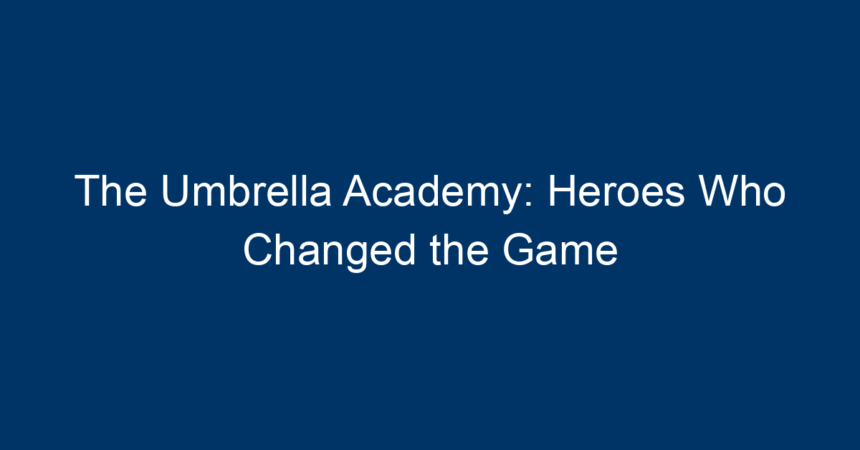Introduction
The world of superhero narratives has undergone a tectonic shift in the past decade. Gone are the days when caped heroes were portrayed merely as invincible icons of justice. Enter The Umbrella Academy, a groundbreaking Netflix series based on Gerard Way’s comic books, which has captivated audiences since its debut. This unique series not only redefines what it means to be a hero but also dives deep into the complexities of family dynamics, mental health, and personal growth. Join us as we explore the intricacies of The Umbrella Academy and the unforgettable heroes who have altered the superhero landscape.
The Genesis of The Umbrella Academy
A Unique Creation
The Umbrella Academy was created by musician and comic book writer Gerard Way, who wanted to craft a narrative that combined his love for comics and the transformative power of storytelling. First hitting shelves in 2007, the comics were later adapted into a series by Netflix in 2019, rapidly gaining a global following. This adaptation is not your typical superhero saga; it embraces flawed characters and intricate relationships, broadening the definition of heroism.
Inspirations and Themes
Drawing inspiration from eclectic sources, The Umbrella Academy showcases a mixture of the dysfunctional family trope, exploration of trauma, and the acceptance of one’s flaws. The narrative threads through various themes such as mental health, the impact of childhood trauma, and the power of love, making it relatable to a diverse audience. These elements resonate deeply with viewers, setting the series apart in an ever-growing genre.
Meet the Heroes of The Umbrella Academy
Number One: Luther Hargreeves
Luther, also known as Spaceboy, is a towering figure with superhuman strength. However, his story transcends mere physical attributes; it delves into themes of insecurity and the need for approval. Raised in the shadows of his father’s expectations, Luther’s journey from a lack of confidence to a full acknowledgment of his capabilities is a significant aspect of The Umbrella Academy.
Number Two: Diego Hargreeves
Diego, the skilled assassin with the ability to curve bullets, represents rebellion and defiance against authority. His struggle between loyalty to family and the desire for personal identity invites viewers to reflect on the balance between duty and self-discovery. Diego’s character development sheds light on the importance of finding one’s path in a chaotic world.
Number Three: Allison Hargreeves
Allison, or The Rumor, showcases the complexities of manipulation and truth. With the ability to make people believe whatever she says, Allison’s narrative arcs reveal the consequences of lies and a yearning for authenticity. Her challenging path through relationships and motherhood highlights the intertwining of power with morality.
Number Four: Klaus Hargreeves
Klaus, the medium of the group, offers comedic respite yet carries the weight of trauma and addiction. His journey through grief and self-acceptance allows viewers to engage with darker themes like loss and denial while providing levity and humor. Klaus’ eccentric personality and emotional depth make him a fan-favorite character, proving that heroes aren’t always straightforward.
Number Five: The Boy
This time-traveling assassin, who appears as a 13-year-old but possesses the wisdom of an adult, encapsulates the theme of lost potential and life choices. Five’s struggles with isolation and purpose resonate with anyone who has ever felt out of place. His ability to navigate through time to fix his family’s past emphasizes accountability and growth, making him one of the standout characters.
Number Six: Ben Hargreeves
Ben, the deceased sibling who can summon monstrous tentacles, serves as a manifestation of unfulfilled potential and the desire for connection. His relationship with Klaus is deeply moving, showcasing the complexity of sibling bonds and unresolved issues. As Klaus grapples with his abilities while balancing his relationship with Ben, the show deeply explores concepts of love, loss, and remembrance.
Number Seven: Vanya Hargreeves
Vanya, initially thought to be without powers, emerges as a powerful and tragic figure. The story of Vanya showcases the struggles of feeling inadequate and being misunderstood. As her true abilities awaken, Vanya’s transformation into The White Violin serves as a commentary on the reclamation of self-identity and latent potential. Her character arc is a powerful reminder that everyone has a story worth telling.
The Cultural Impact of The Umbrella Academy
Redefining Heroes
The Umbrella Academy dares to question traditional archetypes, presenting heroes who are just as flawed and misguided as the villains they face. This new breed of superhero resonates with audiences who favor complexity over perfection, highlighting that the path to heroism is often paved with mistakes and failures.
Addressing Mental Health
One of the most significant contributions of The Umbrella Academy is its candid exploration of mental health issues. Characters wrestle with trauma, depression, and addiction, and the series doesn’t shy away from showcasing the lifelike struggles many face today. By addressing these topics, The Umbrella Academy helps destigmatize mental health discussions, encouraging viewers to seek help and embrace their struggles.
Championing Diversity
The series incorporates a diverse ensemble cast, reflecting the real world more accurately than many typical superhero narratives. With a rich tapestry of backgrounds, The Umbrella Academy champions inclusion and representation, showing that heroism has no boundaries. This broad appeal empowers a wider audience to see themselves as part of the hero’s journey.
Conclusion
The Umbrella Academy has undoubtedly changed the superhero game by introducing a narrative rich in character development, emotional depth, and cultural significance. Its portrayal of heroes who grapple with insecurities and trauma resonates with audiences and challenges traditional norms in the genre. The show’s success serves as a beacon for future superhero narratives, pushing for complexity, authenticity, and representation.
Actionable Insights
- Embrace Imperfection: Whether in storytelling or personal life, it’s important to recognize that flaws add depth. Appreciate your complexities.
- Prioritize Mental Health: Just like the characters in The Umbrella Academy, don’t hesitate to seek help. Removing stigma around mental health can lead to healing.
- Celebrate Diversity: Embrace different perspectives in your life, just as this series celebrates a diverse range of characters and stories.
- Redefine Success: Understand that heroism comes in many forms—sometimes, it’s found in ordinary actions, and sometimes, it’s in the journey of self-discovery.
In conclusion, The Umbrella Academy is more than just a superhero story; it’s a profound narrative that inspires and challenges its audience to reflect on the very essence of what it means to be a hero.




